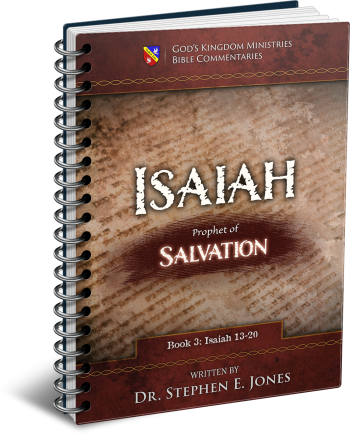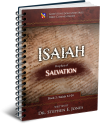Latest Posts
View the latest posts in an easy-to-read list format, with filtering options.

Isaiah is the prophet of Salvation. He is also known as the truly "Universalist" prophet, by which is meant that He makes it clear that salvation is extended equally to all nations and not just to Israel. He lived to see the fall of Israel and the deportation of the Israelites to Assyria, and he prophesied of their "return" to God (through repentance). He is truly a "major prophet" whose prophecies greatly influenced the Apostle Paul in the New Testament.
Category - Bible Commentaries

After telling us that foreigners would “attach themselves to the house of Jacob,” Isaiah 14:2 continues,
2 The peoples will take them along and bring them to their place, and the house of Israel will possess them as an inheritance in the land of the Lord as male servants and female servants, and they will take their captors captive and will rule over their oppressors.
Once again, most people read this through Old Covenant eyes, not realizing that there is more than one way to fulfill this. If this had been fulfilled in Isaiah’s time, the Israelites would have conquered the Assyrians and brought them as captives back to Israel, where they would have been enslaved. Such was the normal practice under the Old Covenant.
But this is an end-time prophecy to be fulfilled in the day of the Lord when Babylon falls. The New Covenant has now been ratified by the blood of Jesus Christ, and all men are now accountable to God to live by its principles. To bring captives “to their place” or “their own land” (vs. 1) is no longer the mere type and shadow (Canaan). It is now the “better country” that Abraham sought (Heb. 11:16), for we read in Heb. 11:15,
15 And indeed, if they had been thinking of that country from which they went out [i.e., the old land of Israel], they would have had opportunity to return.
In other words, if the “return” of the Israelites had been a proof of Zionism, they might have had opportunity to return to that old land. But instead, God promised a better country with better promises based on the New Covenant. The promise of God is a change of heart, nature, and body which will be glorified through the fulfillment of the feast of Tabernacles.
For this reason, says the author of Hebrews, God did not allow the Israelites to return to the old land, for that inheritance was a mere type and shadow of the true. Modern Zionism, then, is an attempt to restore the Old Covenant inheritance.
Christian Zionism is a failure to implement the New Covenant. Christians will be held accountable for this failure, because they should know better than to adhere to the Old Covenant or to seek its inferior inheritance.
Slavery has existed for thousands of years. There are more slaves today than ever before, especially in nations founded in Old Covenant thinking. To take people captive and enslave them was “normal” in biblical days, and it was upheld by the law itself, when done for the right reasons and in a lawful manner.
However, kidnapping was unlawful (Exodus 21:16), because it was a sin to enslave anyone forcibly or without lawful cause. Hence, human trafficking has always been a sin. But if a man incurs a debt that he cannot pay, the law can put him into slavery to work off his debt. Biblical slavery is where the law justly enforces one man’s authority over another.
For example, when the nation of Israel continued in sin, her “debt” grew to the point where it was not possible to pay. God often “sold” Israel into the hands of foreign nations, according to the law in Exodus 22:3. We see examples of this throughout the book of Judges (Judges 3:8; 4:2; 10:7). Hence, God was justified in selling Israel into slavery.
Yet when we approach the law with New Covenant eyes (i.e., with the mind of God), we see that such judgment, including slavery (Isaiah 26:9), was intended to teach sinners righteousness. In fact, that was always one of God’s purposes for slavery. The slave master was to teach the sinner BY EXAMPLE how to live a righteous life, and he was given the lawful authority to impose righteousness upon the sinner.
All of God’s judgments were imposed with this purpose in mind. Hence, it was the intent of God that sinners be enslaved by righteous men, whose authority would be used for the ultimate benefit of the slave. The slave-owner was responsible before God to teach the sinner how to live righteously, just as any parent is responsible to teach his children how to live a righteous life by faith in God.
Authority brings an equal level of responsibility. Conversely, enslavement reduces a man’s responsibility for his own actions, for he remains under authority. The slave-owner is responsible to God for the actions of the slave.
When God sold Israel to other nations, it was actually a merciful act, because it meant that Israel’s debt-liability had been given to a foreign nation. While in captivity, Israel ceased to be responsible for their own debt to sin. When the sentence was completed, the foreign nation, which did not take their responsibility seriously, was then judged for not paying Israel’s debt, as the law demanded.
In Isaiah 14:2, the prophet says that Israel “will take their captors captive and will rule over their oppressors.” The slave-owners in this case are those who are coming to “their own land” and “to their place.” They are the ones who, through judgment of slavery, will be given their glorified bodies, making them fully in the image of God, which is their inheritance. The real question, then, is how will they rule these foreigners? Will they oppress them even as they had been oppressed? Or will they rule with love, even as Christ rules the earth?
The Old Covenant mindset enslaves men for its own benefit. Such people fulfill the desires of the flesh which wants to be served by the labor of others without being responsible for the well-being of the slave. Such carnal slavery never contemplates an end to slavery. Carnal men consider themselves to be God’s Privileged People who are entitled to be served perpetually by slaves. They think that the law of Jubilee does not apply to their slaves but only to themselves.
But look at the example of Christ in Eph. 4:7-13,
7 But to each one of us grace was given according to the measure of Christ’s gift. 8 Therefore it says, “When He ascended on high, He led captive a host of captives, and He gave gifts to men…” 11 And He gave some as apostles and some as prophets, and some as evangelists, and some as pastors and teachers, 12 for the equipping of the saints for the work of service, to the building up of the body of Christ, 13 until we all attain to the unity of the faith, and of the knowledge of the Son of God, to a mature man, to the measure of the stature which belongs to the fulness of Christ.
In other words, when Christ ascended to the right hand of the Father, having been given authority over the whole earth, “He led captive a host of captives and He gave gifts to men.” Who were the captives, and what gifts did He give them? The gifts given to the church were apostles, prophets, evangelists, pastors, and teachers. The purpose of those gifts was to bring everyone to a place of spiritual maturity. In other words, Christ’s slavery was designed to benefit the slaves!
Paul himself was among those captives, for he called himself “a bond-servant of Christ Jesus, called as an apostle” (Rom. 1:1). Paul was given the gift of apostleship, not so that he might enslave others to his own will and pleasure, but so that He might teach the church the ways of righteousness. That is the true purpose of slavery from God’s New Covenant perspective.
The purpose of authority is not to have slaves but to become a bond-servant of Christ and exercise authority as Christ would. In other words, the one in authority is made responsible for those under his authority, even as a slave is held accountable to him. For this reason, Matt. 23:11 says, “But the greatest among you shall be your servant.”
Those with an Old Covenant mindset have not yet reached the stature of the fulness of Christ. They will not be given authority in the Kingdom of God, for Christ will not have tyrants ruling with Him in His throne. Hence, those who interpret Isaiah 14:2 as a license to take vengeance are not yet overcomers, for they take pleasure in tormenting those who had abused them in the past.
Isaiah 14:2 should be interpreted through the New Covenant. When Christ overthrows Babylon, the Babylonians will be taken captive for the Kingdom of God. Authority will be given to the overcomers (true Israel) to enforce the principles of righteousness, thereby teaching those carnal and lawless people the ways of God. In this way, “the overcomers will rule over their oppressors.” While the flesh may complain for a while as it adjusts to the new reality, these ex-Babylonian citizens will be given gifts of apostles, prophets, evangelists, pastors, and teachers, so that they may be trained in the ways of righteousness.
Zion was a mount in Jerusalem; Sion was Mount Hermon (Deut. 4:48). Zion was the seat of authority for the earthly Jerusalem; Sion is the seat of authority for the heavenly Jerusalem.
Paul tells us that the earthly Jerusalem is Hagar, the place of bondage and the Old Covenant, which corresponds to Mount Sinai in Arabia (Gal. 4:24, 25). Hence, when Israel gathered around Mount Sinai, they established the Old Covenant, and when the leaders in Jerusalem rejected Jesus as the Mediator of the New Covenant, they confirmed that Jerusalem would remain under the jurisdiction of Mount Sinai—that is, Hagar.
But Hebrews 12:22, KJV tells the church,
22 But ye are come unto mount Sion and unto the city of the living God, the heavenly Jerusalem, and to an innumerable company of angels.
We are not coming to Mount Zion, nor to Mount Sinai, for we are not the children of Hagar but of Sarah. Mount Hermon (Sion) was the place where Jesus was transfigured and proclaimed to be the Son of God (Matt. 17:5). Though only three disciples accompanied Jesus to the mount at that time, it became the place where all true believers gather to Him as “Shiloh,” according to the prophecy in Gen. 49:10, KJV and again in Hosea 1:11.
Note the contrast between Zionism and Sionism. Zionism is a carnal political movement that seeks to establish its mother, the earthly Jerusalem, as the mother of the Kingdom. That movement seeks to conquer the land and to expel its inhabitants. It has enslaved the Palestinians and anyone else who gets in their way, for, as Paul says, Zionists are the children of the bondwoman. They provide us the example of slavery and its misuse and abuse of slaves.
Sionism is the heavenly Jerusalem, whose children are “the general assembly and church of the firstborn who are enrolled in heaven” (Heb. 12:23). The children of Sion seek to establish their mother, Sarah, in order to establish true freedom through the New Covenant. By gathering around Jesus at Mount Sion, we set the example of New Covenant slavery, where being a bond-servant of Jesus Christ is true liberty.
Along with all of creation, the present-day Babylonians will be set free from the bondage of sin and corruption, so that they too may enjoy the blessings of salvation and come into the image of Christ that was promised in the New Covenant.